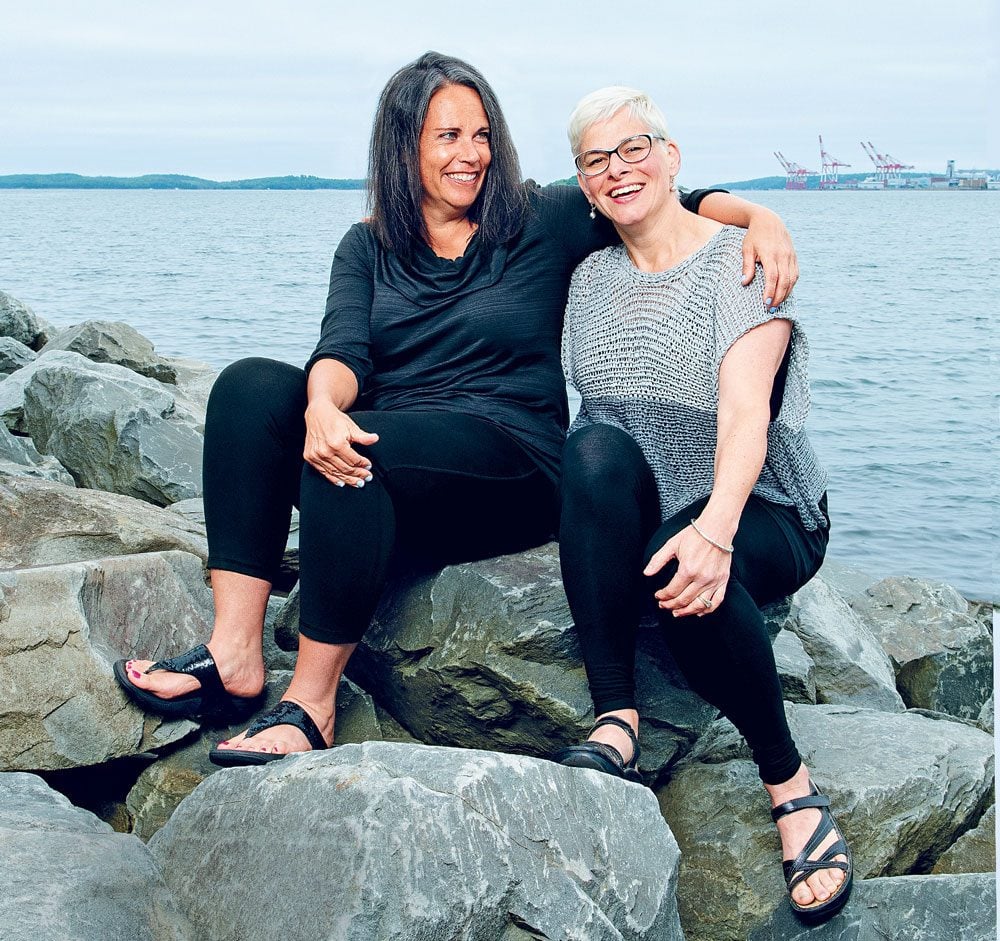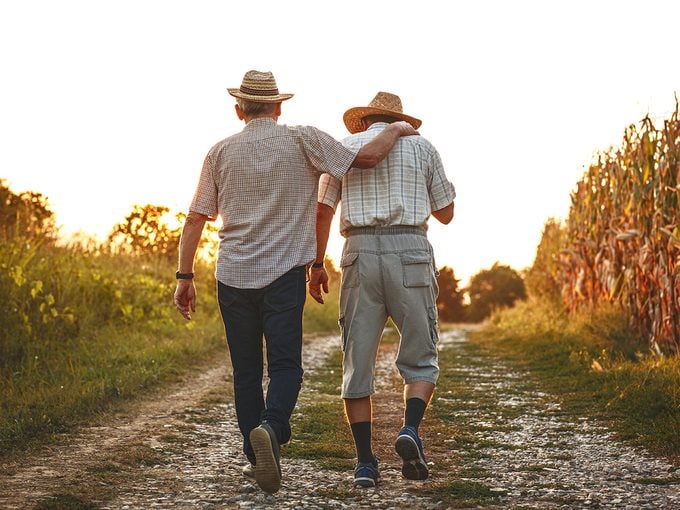How to Make New Friends as an Adult
It starts with courage and vulnerability.

A Friend in Me
Anne-Marie McElrone’s and Susan Goupil’s sons played together on the same Dartmouth, Nova Scotia soccer team, but they had never met. Then Goupil volunteered her home as the pick-up spot for the team’s uniforms—and answered the door wearing leggings and high heels. “Wow,” McElrone remembers thinking, “that’s impressive for 10:30 a.m. on a Saturday.”
It wasn’t just Goupil’s style that impressed McElrone—it was her positive energy. The two started chatting at games. When Goupil asked for help with a team barbecue, McElrone volunteered her grill. They started going to yoga together. Soon, they were introducing each other to their friend groups. “I wasn’t expecting to make new friends at my age,” says McElrone, now 53. “Not those close, turn-to-all-the-time kinds of friends.”
Close friendships can be transformative—and not just for our social calendars. Friends make us feel safe and reduce our stress. In Goupil, McElrone had found a confidante, and someone she can count on. Their now eight-year-old friendship has also helped her discover new things about herself. “I wasn’t always comfortable in my skin,” she says. “I’ve found a way to be more confident and more myself by watching her and seeing her reflect back to me what she sees in me.”
Making—and keeping—friends can be challenging at any age, but it can feel especially daunting as we grow older. Time, distance, work and family responsibilities can all become barriers to finding and maintaining friendships. Luckily, there are simple things you can do to both deepen existing friendships and build new ones.
How to Make New Friends as an Adult
Take action
When you’re feeling lonely and isolated, it can be hard to bond with others. To break the cycle—or prevent it in the first place—you need to be proactive.
Let your interests guide you and look for activities that provide consistent social interaction. Enjoy cross-country skiing? Join a weekend ski club. Love animals? Join a bird-watching group. Passionate about plants? Volunteer at a community garden. You’re bound to meet people who share your interests and maybe some of your range of life experiences, too.
Then, make the most of it: ask questions, be curious and propositional, and don’t give up. “We need five to eight interactions with someone to feel like we’re casual friends—and more than 200 hours to develop a close friendship,” says Shasta Nelson, author of Frientimacy, a practical guide to deepening friendships. “Give yourself the time: don’t go to an activity once or twice and feel like you should feel close to someone already.”
Nelson also urges people not to let their insecurities get in the way. “A lot of people say, ‘I invited her last time, and now it’s her turn.’ But if we want friendships, we need to be the ones to make them happen.”
Once you’ve established a connection, keep putting in the time. McElrone and Goupil talk regularly and get coffee together weekly. They sometimes take weekend trips.
“People get into ruts,” says McElrone. “As we get older, we sometimes think, ‘These are the things I do, and these are the people I do them with,’ and that’s that.” If you want to build your friend group, or connect more with an existing friend, be willing to get out of that rut and put in the time and effort to make friendship happen.

Build communication
Putting the time into friendships builds closeness, but it’s only one part of the equation. Establishing open communication, practising acceptance and being vulnerable are all key to feeling more connected, and can help transform an old acquaintance into a new friend. “When most of us feel lonely or dissatisfied,” says Nelson, “it’s not a lack of interaction, it’s a lack of intimacy.”
McElrone says Goupil’s openness and direct communication style gave her permission to bring her whole self to the friendship. That’s helped them build mutual trust and respect. While such open communication isn’t always easy, it is an essential part of learning how to make new friends as an adult.
When you feel unheard, you also feel less safe. That can have serious repercussions for friendships, says Amir Levine, a New York-based psychiatrist, neuroscientist and co-author of the book Attached, which explores the science of human attachment. Levine says the best relationships check five key boxes: consistency, availability, responsiveness, reliability and predictability.
When one of those is absent, it can hurt a friendship. Because we tend to expect less of friendships than of romantic relationships, we too often accept failures instead of trying to improve the situation. It’s a bad habit that can keep our friendships from reaching their full potential. Putting your finger on what you need from your friends and being able to honestly communicate that need—and to accept when your friend does the same—are required to build lasting connections.
Put in the effort
Long-time pals Lynne Everatt, Julie Smethurst and Deb Mangolt met while working for the same company. They’ve stayed close friends through job, life and location changes. Trying out new activities together is one of the ways they keep their strong friendship thriving.
“We believe we have to be deliberate about friendships, and make caring for them a priority,” says Oakville, Ontario-based Everatt, who’s in her fifties. “There’s no way you’re going to hack friendship. You’ve got to put the effort in. The more I give, the more I get.”
The trio recently wrote Acts of Friendship, a guidebook filled with activities they’ve used to build and deepen their own friendship. Suggested activities include playing improv games, big-goal brainstorming sessions and crafting fun friendship quizzes to get to know each other better. By venturing into unknown, sometimes uncomfortable spaces with your friends and sharing your fondest dreams—and most embarrassing moments—you’ll discover new things about each other and yourself.
You may also learn which friends are willing to go on a journey with you and which would rather stay home. When pursuing transformative friendships, reciprocity is key. Focus on turning up the volume on the people who display those five good friendship qualities, says Levine, and turn down the volume on everyone else. You’ll create a better social environment for yourself, and build friendships that will stand the test of time.
Now that you know how to make new friends as an adult, check out the surprising science behind friendship.






